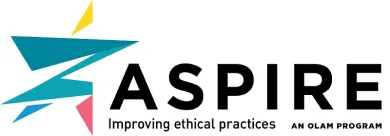
Improve your ethical practices in international development, humanitarian aid, and global service

OLAM's Aspire program offers our partners tools to assess and deepen their ethical practices.
Aspire takes a holistic approach to help our partners understand and meet international ethical standards in international development. Aspire tools include: a self-assessment survey, educational sessions and workshops, ethical practices spectrums, microgrants, and peer learning groups.
How can you improve your ethical practices, whether you are just beginning or are a leader in the field?
Ethical Best Practice Spectrums
A set of tools, created by and for our partners, to help you identify areas for improvement, as well as specific items in a variety of areas, from ethical communications to monitoring & evaluation.
Aspire Microgrants
Access up to $1,500 to support your organization's work to embed ethical practices.
Resources
Find recommended resources from around the world to guide your ethical journey.
Webinars & Workshops
See calendar of upcoming sessions and recordings of past sessions, for practical steps shared by experts.
Peer Learning Groups
Get matched with other organizations to share dilemmas and challenges, and to learn from one another. For OLAM partners & members only.
Understand how you can make the most out of Aspire
Contact us now to schedule your one-on-one consultation.
What people are saying
Gilad Ovadia, AgriFriend
Dr. Einav Levy, The Israeli School of Humanitarian Action
Jenn Lavelle, AJWS
Jill Elias, ASYV
Jacob Sztokman, Gabriel Project Mumbai
Brian Schneider, Justifi
Molly Levine, Kulanu
Aspire Topics
Because ethical practices is such a broad subject, Aspire focuses on a few topics in depth:
Step-by-step
While Aspire will invariably be a different experience for each of OLAM’s partner organizations, these are the steps we recommend you take on the journey:

Partners take a self-assessment survey to help them understand where their work falls on a spectrum of ethical best practices. OLAM staff will not see the results unless partners give them permission to review the survey.

Partners attend OLAM workshops and training sessions that will give them the tools needed to progress on the ethical practices spectrums.

Throughout the year, partners and members can access:
- A one-hour consultation with OLAM staff
- Microgrants to support partners’ ethical practices work (can be used to fund staff training, hire a mentor or consultant, host gatherings around this work, adjust databases and websites, and more)
- Peer-to-peer groups to ask questions, share dilemmas and challenges, learn from one another, and get advice from experts in the field.
- Additional support, as needed

Each year, partners will have the opportunity to retake the self-assessment surveys in order to see their progress on the ethical spectrums, and to understand where work is still needed. OLAM will collect stories highlighting our partners’ successes, so that we can all continue to learn from each other.
New topics may be added to the Aspire program each year, following consultations with expert steering committees. Current topics may be updated.
Meet our Steering Committees
We are grateful to our steering committees for their advice and guidance, which allowed us to create the Aspire program based on real-life experiences and expertise.
Climate Steering Committee
Communications Steering Committee
Community Engagement Steering Committee
Global Service Committee
Monitoring & Evaluation Steering Committee
FAQs
In the process of creating the Aspire program, OLAM worked with an outside consultant and steering committees of 12 professionals, both inside and outside our network, who have deep knowledge about ethical best practices in the field of international development. This collaboration included sharing their expertise, helping to prepare Aspire documents, and working together to formulate a program that is aligned with the most current global ethical practices.
Yes! Whether the entirety of your organization’s work, or just one of its projects, relates to international development, understanding and reflecting on ethical practices can be relevant to other aspects of your work.
The amount of time you spend depends on a number of factors, such as:
- how many topics your organization focuses on
- where your organization falls on the spectrum tools
- how your organization prioritizes this work,
- and how many staff members are involved.
To make the most out of this program, you should:
- Take the self-assessment survey (~1 hour)
- Participate in the informational webinar (~1 hour), or watch it later if no one from your organization can attend the live event
- Assign a staff member to be the point person at your organization for the ethical practices work
- Decide on at least one topic to focus on each year
- Take part in at least two training sessions or workshops throughout the year (~1 hour each)
- Retake the self-assessment survey each year
The amount of time an organization spends on this work can fluctuate throughout the year, depending on capacity, project cycle, staffing, etc. However, OLAM sees this work as long-term, and encourages organizations to think about improving ethical practices all year round.
Yes. Similar to participation in Focal Point and our annual partner renewal survey, we see a commitment to deepening ethical practices as central to what it means to belong to OLAM’s network. We expect you – our partners – to be active participants in the Aspire program, sharing your experiences and expertise with others and identifying areas for growth. This will ensure that as a network, we can pursue our goals of supporting the world’s most vulnerable people ethically and justly.
In recent years there has been a grassroots demand on the part of OLAM partners that we work to support each other in deepening our ethical practices and reaching international standards in our work. As a result, OLAM has facilitated conversations about these issues through Focal Point, focus groups we convened to study this issue, and our Do No Harm webinar series. Aspire is the next step on this path.
Please email Yael Shapira, OLAM’s Director of Network Engagement and Programs, for any questions or concerns you may have about Aspire: yael@olamtogether.org.
Often best practices and ethical practices are one in the same. The Aspire program is specifically focused on actions that organizations take that have implications for the well-being of the communities they serve. While not following general best practices could lead to lack of professionalism in your work, not following ethical best practices can – directly or indirectly – cause harm to these populations.







.JPG)





.png)











